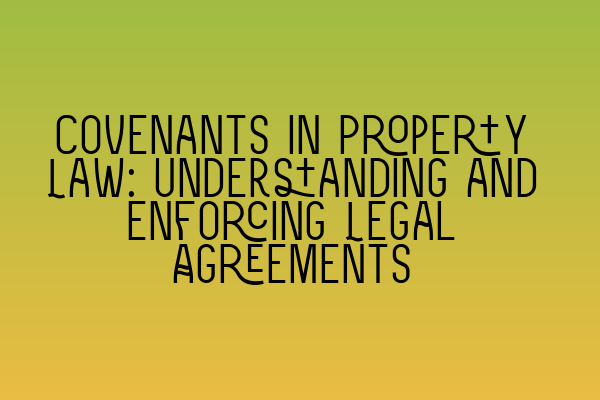Covenants in Property Law: Understanding and Enforcing Legal Agreements
As a leading solicitor at SQE Property Law & Land Law, I frequently encounter clients who have questions and concerns about covenants in property law. Understanding and enforcing these legal agreements is key to ensuring a smooth and successful property transaction. In this blog post, I will provide a comprehensive overview of covenants in property law, explain their significance, and offer practical tips for enforcing them.
What are Covenants and Why are they Important?
Covenants are legal agreements that impose certain obligations or restrictions on the use and enjoyment of a property. They play a vital role in property transactions as they protect the rights and interests of both the buyer and the seller. Covenants can cover a wide range of issues, from maintaining the property’s appearance to restricting certain activities on the premises.
Enforcing Covenants: The Importance of Legal Expertise
Enforcing covenants requires a solid understanding of property law and the legal tools available to parties involved. As a solicitor with expertise in property law, I can guide clients through the process, ensuring that their rights are protected and any breaches of covenant are addressed appropriately. It is crucial to seek legal advice early on, as enforcement strategies may vary depending on the nature of the breach and the specific terms of the covenant.
Types of Covenants in Property Law
There are two main categories of covenants in property law: positive covenants and restrictive covenants. Positive covenants require the property owner to perform certain actions, such as maintaining the property or contributing to the upkeep of shared facilities. Restrictive covenants, on the other hand, limit the use or development of the property in certain ways. These can include restrictions on building height, noise levels, or the creation of additional structures on the land.
Enforcing Covenants: Practical Tips
When it comes to enforcing covenants, following these practical tips can significantly increase the chances of success:
1. Understand the Covenant: Thoroughly review the terms of the covenant to ensure that it is valid, enforceable, and relevant to the situation at hand.
2. Gather Evidence: Collect relevant evidence of any breach of covenant, such as photographs, correspondence, or witness statements. This evidence will strengthen your case when it comes to enforcing the covenant.
3. Consult an Expert: Seek legal advice from a property law specialist who can guide you through the enforcement process and help you navigate any challenges that may arise.
4. Negotiation and Mediation: Consider exploring alternative dispute resolution methods, such as negotiation or mediation, before resorting to litigation. These approaches can often result in a quicker and more cost-effective resolution.
5. Court Action: If all other avenues have been exhausted, court action may be necessary to enforce the covenant. Working with an experienced solicitor who understands the intricacies of property law is essential for success in court.
Enforce Your Covenants with SQE Property Law & Land Law
At SQE Property Law & Land Law, we have a team of dedicated solicitors who specialize in property law and have extensive experience in covenant enforcement. Our expertise, combined with our commitment to delivering exceptional client service, allows us to guide you through every step of the process and ensure your covenants are enforced effectively.
For more information on SQE 1 Practice Exam Questions, SQE 1 Practice Mock FLK1 FLK2, SQE 2 Preparation Courses, SQE 1 Preparation Courses, and SRA SQE Exam Dates, please visit the links provided.
In conclusion, covenants in property law are crucial legal agreements that protect the rights and interests of property owners. Understanding and enforcing these covenants requires legal expertise and a strategic approach. If you need assistance with covenant enforcement or any other property law matters, do not hesitate to contact us at SQE Property Law & Land Law. We are here to help you navigate the complexities of property law and ensure a successful outcome.
